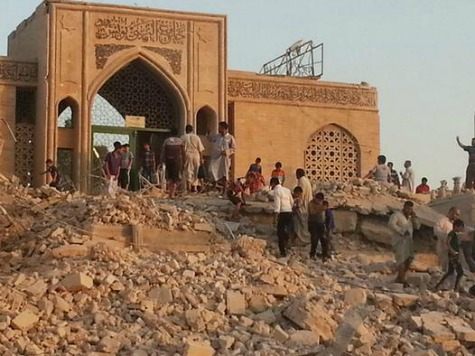Since the Islamic State (ISIS/ISIL) began establishing its Caliphate across Syria and Iraq, they have taken to destroying historic shrines and temples to prevent the practice of “idolatry.” With the surviving priceless artifacts going to fund ISIS on the black market, a group of Syrian “Monuments Men” are racing against time to save the country’s precious history.
The Wall Street Journal described the men as “graying academics,” not the typical fighters. They travel across the country to historic sites “to save ancient artifacts and imperiled archaeological sites from profiteers, desperate civilians and fundamentalists.”
“What started as opportunistic theft by some has turned into an organized transnational business that is helping fund terror,” said Michael Danti, an archaeologist at Boston University. “It’s the gravest cultural emergency I’ve seen.”
The leader of the group, who requested not to be identified, is an archaeologist from Damascus University. He said the group is similar to the World War II “Monuments Men,” who attempted to save Europe’s history.
“It’s dangerous work. We have to get in and out of a site very quickly,” he claims. “The looting has become systematic, and we can’t keep up.”
The group formed in 2012 and immediately catalogued all damages to any important site. Another archeologist told The Wall Street Journal the men “knew each other before the war” broke out in 2011.
“We started this because we believe so strongly it’s the right thing to do,” he said.
There are over 200 people within the group. The terrorists and the Syrian regime want to stop these Monuments Men, which forces the group to “rely on friends, informers and sympathetic rebel commanders.” Senior members pose as antique dealers to take back stolen items.
In August, National Geographic reported that archaeologists from the University of Pennsylvania’s Cultural Heritage Center, the International Council on Monuments and Sites, and Heritage for Peace trained Syria-based archaeologists to save history. In one workshop, the volunteers showed the Syrians how to conserve precious items, “such as wrapping mosaics and ceramics in Tyvek, a tough, lightweight plastic used in construction, before burying or sandbagging them.” Museums are in danger.
“We’ve seen a lot of artifacts turning up here … Ottoman-era coffee pots, and older coins and statuettes,” said Harun Unvar, a man who owns an antique store and rejected many stolen historic items. “Refugees try to sell small items, but the big stuff is stolen and sold privately for big money.”
But the antiques pushed the Islamic State’s bank accounts from under $1,000 to billions. Many are sold to Western antique collectors. The United States and Europe want to pass anti-smuggling legislation. In October, Representative Christopher Smith (R-NJ) said he wants legislation to curb “the sale of stolen antiquities from conflict zones such as Syria and Iraq.” The United Nations Security Council also distributed a resolution to ban antique trades in Syria.
“The expanding link between antiquities looting and terrorist financing is raising political awareness. Governments should now work to ensure they are limiting this funding link to terrorism,” said Mark Vlasic, a Georgetown University law professor.

COMMENTS
Please let us know if you're having issues with commenting.